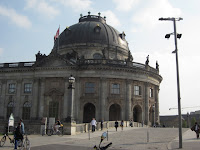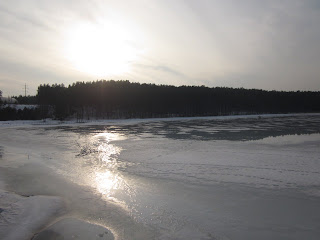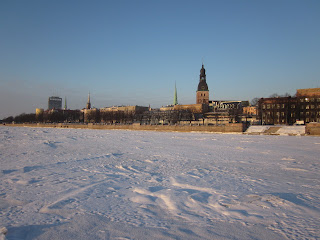




One interesting thing we saw which we wouldn't have known about had we not walked, was large graffiti signs (sometimes covering whole sides of buildings) telling "Media Spree" to, well..."fudge off." What we learned later was that Media Spree was a property investment company that was buying up land, often historical land, in Berlin and turning it into new buildings or shopping areas. Many locals were extremely upset and claimed that the group was ruining the culture of Berlin. When we finally got to the Berlin Wall, what we saw wasn't as impressive as we had hoped. However, we just turned out to be on the wrong side of the East Side Gallery. Fortunately, we were able to see the Gallery on our last day of the trip, accompanied by Luke, a friend from Vermont we had met. The longest remaining strip of the Berlin Wall had been converted into a gallery where people expressed everything from cultural to political themes. It was a very neat part of Berlin that I was glad I got to see.
To avoid bogging down the blog, I'll split the rest of our trip into four main parts - sites, relationships/nightlife, culture, and food. However, my first day of Berlin proved to be the one in which I only got a feel for each of the areas, and it pales in comparison with the rest of my experience, which transformed my view of Berlin into what it is now. I'll begin with sites. After the Berlin Wall, Janie and I continued to explore by foot. We saw the Brandenburg Gate (which marked the entrance into West Berlin), and Checkpoint Charlie, which is where the entrance into American held territory once was. Here we got a large dose of history that explained the events in Berlin from the end of WWII up to the fall of the Wall. However, Janie and I realized that in order to see as much of Berlin as we wanted, we would have to find a way other than walking. On the next day, we decided to take a bus tour, in which we traveled around the whole of the heart of Berlin. On the tour, we saw the Tiergarten, the Bundestag (Parliament building), Postdamer Platz, KaDeWe (the second largest department store in Europe and the oldest in Germany), the famous Victory Tower, the Topography of Terror, Alexanderplatz once again, the Berliner Dom, the University where Einstein studied, and many other sites, all the way back to the Brandenburg Gate. What was good about the bus tour is that we were able to hop off at any time, and then hop back on when we wanted to continue. We tried to go into the Bundestag, but an appointment was needed, but we did see the Topography of Terror (which was where the secret Gestapo headquarters were located) and the memorial to the Berlin Wall, as well as the island of museums and Einstein's University.


For the next two days, we spent time visiting some of these sites. The most prominent ones we visited, as well as my favorite, were the Holocaust Museum and the Berliner Dom. We visited the Berliner Dom first, which was a Parish and cathedral constructed during the time of the Prussian Empire. The church was magnificent inside, and I loved the way that I was able to compare and contrast it with churches I had seen in Italy years before. What made the church even better, was that there was a climb to the top of the Dome, that gave one of the best 360 views of Berlin for the money. Underneath the church was a massive crypt, where all of the Prussian kings were buried, who were all consequently named Friedrich. Due to it's amazing views, terrific architecture, rich history, and the crypt, the Berliner Dom turned out to be my favorite site we visited in Berlin. The next notable site that we visited was the Memorial to the Murdered Jews of Europe. This was by far the most powerful experience I've had during my time in Europe. The design is a large number of cement blocks placed at different heights. Each block is representative of the number of Jewish souls taken during the Holocaust, and can be thought of as if bodies were laid on top of one another, the total number reaching somewhere around 6 million. Once you enter into the middle of the memorial, you find yourself lost with the blocks towering above. It's difficult to explain this experience, but there is a certain lonely somberness present when you are in the maze of blocks, and for me I realized the insignificance my problems compared to what the victims of such an atrocity felt. Underneath the memorial was a large museum, with each room dedicated to a different telling of the tragedy of the Holocaust. Some parts told the history, others discussed families that the event affected, and the most emotional room was filled with stories. If you ever find yourself in Berlin, this is a museum you have to visit.





The next part of my trip that was amazing was the relationships I made with people from all over, as well as seeing a little bit about the Western European nightlife (completely different from the Eastern European nightlife, and they are both leagues away from our nightlife). First, hostels are a great idea to meet new people, especially for someone my age. What's more is that there was a bar in the hostel that allowed people to have a beer and gather before going their separate ways for the night. However, since most people had no clue where to go for the night, it provided the perfect atmosphere to make new friends. We met some Danish guys and girls from Sweden who we hung out with the first night, and for the next few nights we spent time with some girls in Med school from Kentucky, a group of guys from Manchester our age, an Australian guy who had just moved to Berlin and was looking for a place to stay, and our friend Luke from Vermont. Together, we visited a local bar around the corner that had every sort of beer imaginable (they literally had a menu the size of the Cheesecake Factory's just for beer), as well as the alternative area near the East Side Gallery, famous for Berlin's nightlife. In this area, we took the S-Bahn and checked out Berlin's famous club scene. Although the cover for the club that my roommate recommended was far too expensive due to a special appearance from a famous DJ, just being around the area was very neat. The area was a long strip of buildings and old factories/power plants that had been bombed out during WWII. This whole area had been turned into biergartens and clubs and was a huge scene at night. We did enter one place that was an outdoor courtyard which had once been a building, but had been nearly completely destroyed during the war. All in all, Berlin turned out to be a great place to meet new people, as well as a great nightlife built up from history.
The culture of Berlin was perhaps what surprised me the most. From what I have learned about the German culture in general is that they are a very low-context and independent society for the most part, even more so than the US. Also, the general consensus about the German culture is that they have a strict sense of time, and are more concerned with business than forming long-term relationships, another comparison with the United States. From this knowledge, my expectations were that the German locals I came into contact with would be more concerned with business and getting to the point of things rather than the laid-back lifestyle expected of most Italian or Spanish people. However, Berlin seemed to be the exception to what I have learned about German culture from my classes. In fact, many of the locals in Berlin could be found lounging by the River Spree in beach chairs or on the grass enjoying conversation or just a cold beer. This was true no matter where I went in the city, and often there were large plots of land where sand was laid down and umbrellas were set up near refreshment huts. I thought I was at the beach at one point. I learned during the week that this lifestyle was actually a form of rebellion instilled into the Berlin culture during Soviet rule of East Berlin. Because of the strong demand for work from the Soviets, on every open occasion the locals from Berlin would choose not to work and would show this by laying out on the lawn or sitting near the river. This was a part of Berlin that I loved, and one that made my trip really feel like a vacation.


And finally, a discussion of Germany wouldn't be complete without talking about the food. Before this trip, I actually HATED sauerkraut. I'm not sure what it was, but every time I tried the dish as a child I always had trouble not spitting it right back out. This changed the first night when I had a great meal of sausage, potatoes, and even sauerkraut. Although we did have sushi one day for lunch, for the most part Janie and I tried to stick with the traditional German foods. I had currywurst, a type of bratwurst made in Berlin that was filled with curry and topped with a sauce and a little bit of curry. Of course I had bratwurst as well, which was no comparison with the brats I usually buy at Kroger and grill out with. We also went to a place with Schnitzel and German potato salad, which I took mine prepared in a nontraditional way that was delicious. What I learned about Berlin is that they like their variety of German sausages and their beer, both typical to what I had heard about Germany. As for the food, it was distinctly different from the Russian and Latvian food I had become accustomed to, but still different that American food in so many ways. This makes me excited to travel even more, as it seems that every country in Europe has a traditional food that will make for a different experience everywhere you go. The beer in Germany also did not disappoint. It is easy to see why German beer is held to such a high standard around the world.
All in all, it's safe to say that Berlin was a great trip for Spring Break. Although I spent almost 5 days there, I still feel like there is plenty in the city left to uncover. This is a place I hope to return to someday, and visit the things that you can't find on a day or week's tour. In the end though, one of the things that stuck with me most was my return to Riga. As we crossed the bridge into the city and I saw the skyline of Old Town I see every week, it felt as if I was returning to a place I could call home. This was an interesting feeling for me, as the whole town now feels familiar to me, even though I can't even speak their native language. Perhaps this was my first realization of the reverse culture shock I will have when I come home. The city, state, and culture I grew up in and have known for so long even now seems distant, and although it will be difficult to say goodbye to Riga soon, I am also excited to rediscover my home in Kentucky after all I have experienced here.
































